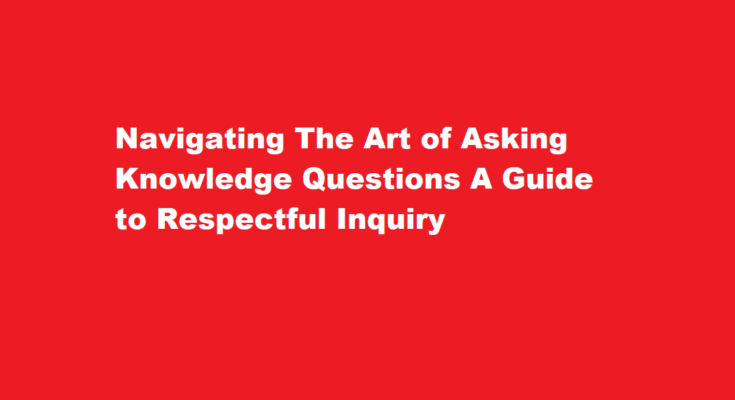Introduction
In our pursuit of knowledge, asking questions is an essential and commendable act. However, we must be mindful that our inquiries are phrased in a way that fosters an atmosphere of respect and openness. This article delves into the art of asking knowledge questions without causing offense, highlighting the significance of empathy, clarity, and cultural awareness in our interactions.
Empathy – The Foundation of Respectful Inquiry
Empathy is the cornerstone of respectful communication. Before posing a question, consider the feelings and experiences of the person you are addressing. Ask yourself if the question could potentially be sensitive or trigger emotional discomfort. Frame your query in a way that shows genuine concern and understanding. For example, instead of asking, “Why do you believe that?” opt for, “Could you please share your perspective on this matter?”
Choose the Right Time and Place
Context is crucial when it comes to asking questions. Ensure that the timing and setting are appropriate for the topic you wish to explore. Avoid asking deeply personal or controversial questions in a public or formal setting, as it might embarrass or make the person uncomfortable. If possible, find a more private and relaxed environment that allows for a candid exchange of ideas.
Use Neutral Language
When formulating your question, aim for neutrality in your language. Avoid loaded words or assumptions that might offend the other person. Steer clear of leading questions that could bias their response. Instead, choose words that encourage an unbiased and honest answer. For instance, replace “Don’t you think that’s a terrible idea?” with “What are your thoughts on this proposal?”
Be Clear and Concise
Clarity is vital when seeking knowledge. Be precise in your question, avoiding ambiguity or convoluted phrasing. Ambiguous questions can lead to misunderstandings and frustration. Conciseness also demonstrates respect for the other person’s time and attention. Ask questions that are straightforward and easy to answer.
Respect Boundaries and Privacy
Not all knowledge questions are appropriate for any given situation. Respect the boundaries and privacy of the person you’re engaging with. If a question seems too personal, intrusive, or private, it’s best to refrain from asking. Remember, establishing trust is essential for fruitful knowledge exchange.
Appreciate Different Perspectives
Cultural and individual differences can significantly influence how questions are perceived. What might be an acceptable question in one culture could be considered intrusive or offensive in another. Be mindful of these differences and approach each interaction with an open mind. If unsure about cultural sensitivities, consider researching or politely asking about the appropriate way to phrase your question.
Listen Actively
Asking a question is only the first step; actively listening to the response is equally important. Show genuine interest in the answer and refrain from interrupting or dismissing their perspective. Active listening fosters a sense of respect and validates the other person’s thoughts and feelings.
Acknowledge Knowledge Gaps
It’s okay not to know everything, and admitting your knowledge gaps is a sign of humility. When seeking information, avoid assuming that the other person has the answer to everything. Phrase your questions in a way that acknowledges your own limited understanding. This approach not only demonstrates respect but also encourages a collaborative learning environment.
FREQUENTLY ASKED QUESTIONS
How do you ask knowledge questions?
“to what extent…”, “how…”, “how far…”, “how does…”, “what…”, “what is it about…”, “what role does…”, “in what sense…”, “under what circumstances…”, “is it possible…”, “why…”, “if…” etc.
What is the best way to ask something?
You need a solid level of certainty and expectation when you ask for something you want. This state of mind will affect everything else—your body posture, eye contact, tone of voice and choice of words. Think for a moment.
Conclusion
Asking knowledge questions is a powerful tool for personal growth and learning, but it must be done with tact and empathy. The art of respectful inquiry involves considering the emotions of others, being clear and concise, and respecting cultural and personal boundaries. By nurturing a culture of empathetic questioning, we create a more inclusive and supportive community of learners, where knowledge is freely shared and exchanged without fear of offense. Let us embrace the art of asking questions with respect and openness, fostering an environment of curiosity and understanding.
Read Also : Mastering The Art of Note-taking from YouTube Videos



